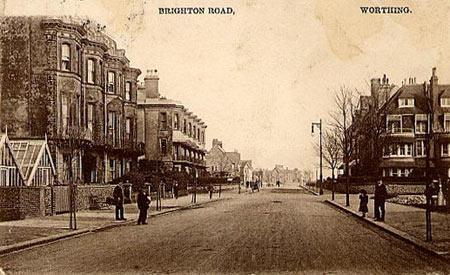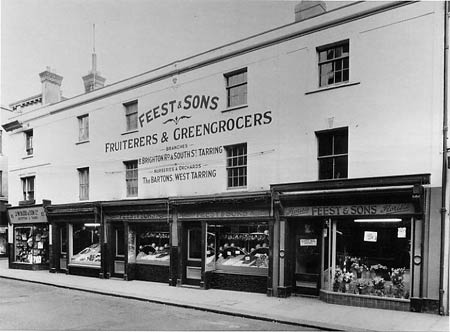|
This article was first published in the West Sussex Gazette on 3rd December 1992.
After looking back at the humble beginnings of Feest & Son, the former Montague Street family firm of greengrocers, and their expansion up to the time of the Great War, the feature continues this week into the 1920s through the eyes of Goring reader Jimmy Feest.
The Worthing Guide of 1925 carried a Feest & Sons advertisement listing three adjacent shop premises -- the third, number 85 Montague Street had by this time been added to the established business at numbers 87 and 89.
The stores at the rear of these premises were large enough to house the delivery vans, and opened out into a road no longer there -- Paragon Street running from Montague Street to the seafront, and now covered by an unsightly multi-storey car park.
At that time, Feests had their own glass houses in South Farm Road -- St Austell's Nursery opposite the Girls High School -- and another nursery in Brighton Road, where a block of flats have now been built almost opposite the Aquarena.

Looking eastward in Brighton Road earlier this century from a point near where the Aquarena stands today. Feest's nursery seen here on the left is where Westminster Court flats have now been built between Farncombe Road and Selden Road.
|
Along the street at 5, Brighton Road was another branch shop of Feests, later number eight.
The family firm was later run by a partnership of Jimmy's father, James, and his brother Charles together with their father.
Jimmy himself worked for the firm when he left school in 1945 just after the war when fruit and vegetable prices were strictly controlled and revised on a frequent basis. Petrol was rationed, and so many customers relied on the delivery service offered by Feests, making regular calls to private houses, rest homes, hotels and restaurants -- 'an important part of the business.'
To operate the various sections of the business it took about 30 full-time employees together with seven members of the Feest family as well as part-time staff and casual workers in the season.
At the main establishment alone, the large Montague Street store, there were no less than seven female shop assistants, two male shop assistants, Jimmy, his uncle, father, grandfather and cousin Douglas, two storemen, four bookeepers of whom two doubled as cashiers, three van drivers, one florist and about three Saturday girls.
Two others Jimmy mentioned, 'My aunt who was a 'private bookeeper' as well as looking after her parents, and a part-time lady who took round the teas in the morning break and cooked the beetroot.'
In addition, each of the two branch shops employed a manageress and three assistants; while the nurseries and market garden had one foreman, two greenhouse staff, probably three or four workmen, and casuals in the summer.
Watercress from a grower at West Ashling was hugely popular with Jimmy's customers, particulary when at its peak in Spring and Autumn.
Delivered daily by rail from Chichester a particularly large consignment would be received on Fridays.
'Four to six 'Pads', each containing 28 lbs of loose watercress came in those large deliveries, was separated and tied into 4 oz bunches, then all sold the same day,' remarked Jimmy, who eventually became a partner in the firm, and went on to say that all sorts of produce was supplied by
Worthing growers, including hothouse grapes(both black and white), French beans grown in hothouses, carnations, pot plants, indoor and outdoor chrysanths, outdoor rhubarb, etc.
Other local growers who supplied the shop included: Pullenberrys of Sompting who produced mainly hot house cucumbers, lettuce, cauliflower, mustard & cress, early tomatoes and spring greens; Groves of Broadwater who grew all manner of cut flowers, bedding plants and perennials; and Marshalls, market gardeners at Lancing, who supplied a variety of green vegetables, mushrooms and greenhouse chrysanths.
In the 1950s, competition from cheaper imported produce gradually increased, although generally of poorer quality, eventually forcing the various nurseries, owned by private individuals and local families around the town, to be sold to developers.
Local wholesalers of fruit and veg who supplied the shop included F. Allen & Sons and also J. Salbstein, who dealt in all kinds of fruit, veg and potatoes, both foreign and home grown.
'The strawberry season was shorter in those days, lasting only about four weeks,' said Jimmy, 'my uncle would buy the bulk of strawberries in Brighton Market, the fruit being grown, I believe, in the Lewes/Chaily area. He would go to Brighton for the 5.30 a.m. market every day in the summer, and less often in the winter, taking a van and driver with him.
'Business at the shop was not always good, there were ups and downs, good times and poor ones.'
In 1961, when housewives' shopping patterns were beginning to change with the coming of supermarkets and frozen foods, the family sold the premises in Montague Street, which by this time had grown to four adjoining shops, passing them on to Tescos to become a supermarket.

Feest & Sons quadruple shop premises in Montague Street before selling out to Tescos in 1961 and subsequent demolition; today the site is marked by Volume One bookshop and Miss Selfridge fashions. Photograph by the late Jack Kent who ran a photographic studio in Montague Street.
|
On the closure of the main business and the sale of the nursery at West Tarring, Jimmy's father and uncle retired, leaving him and his cousin Douglas as partners at the remaining shop in South Street, Tarring.
This enabled Jim to make one or two changes, for up until then, all the firm's book-keeping had been hand written in ledgers, both bought and sales ledgers, with customers' accounts itemised in full detail, but when he was left in charge of the only remaining shop, 'they were still hand written, but with far less detail.'
Over the years it had been very much a family business and it is possible there may have been other relations involved who Jimmy could not recall.
The family tradition is still carried on, however, by Jimmy's cousin Douglas and his wife who own two greengrocery shops -- the Happy Apple opposite the Mulberry pub at Goring, and another at South Ferring.
| |


